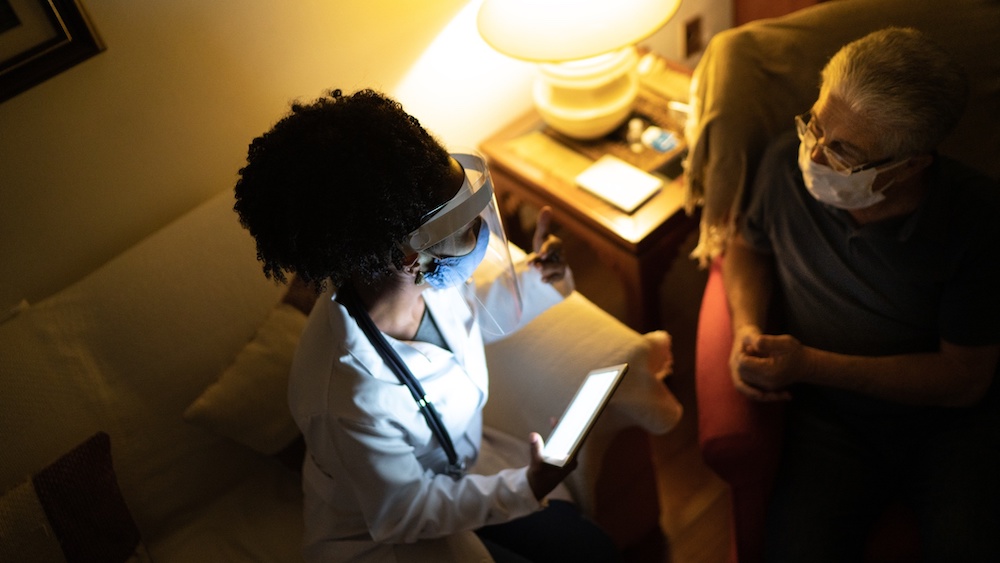By Demetrica Shipp, Home Healthcare Aide, SEIU Healthcare Wisconsin
____
When reports state that communities of color are disproportionately affected by the coronavirus, they do not capture the entire story. My grandmother, my mother, my son and I make up four generations of healthcare workers. I started assisting my mother, who was a home healthcare aide, when I was 12. Every weekend I’d shadow her with such admiration. I knew then that I wanted to be a caregiver.
Beyond being essential workers, several members of my family have pre-existing conditions that make them extremely vulnerable to the coronavirus. My daughter has a rare kidney disease, my son has diabetes and high blood pressure, my other son has epilepsy and my only uncle was recently diagnosed with COVID-19.
Two weeks ago, my sister was hospitalized for a blood clot in her lung. Wisconsin is facing a resurgence in COVID-19 cases, and we are not allowed to be with her in the hospital. The wonderful healthcare workers at the hospital assisted us with Zoom so our family could be at her bedside virtually, and I will always be grateful for that. But even they have struggled during this pandemic. Some of them have been forced to work without proper protective equipment because we haven’t had a federal plan to ensure that we have enough supplies.
Thousands of healthcare workers lost their lives during this pandemic, and it could have been avoided if this administration heeded the warnings of medical professionals and provided the necessary personal protective equipment (PPE). As a healthcare worker, I know if you get sick you can’t go to work and if you get COVID you could die, but I also know that many of us cannot afford to miss work. We have families to feed and bills to pay.
Black women have a rich history in home healthcare. For hundreds of years we have taken care of others, even as our own families struggle to get by in substandard housing, inadequate schools and poor health conditions. We have had to fight for our voices to be heard in all aspects of our lives. Even in 2020. Four years after America realized what so many of us have known for a long time, as an essential worker, as a Black woman, my vote is essential.
Cuts to the Affordable Care Act (ACA) have left me without health insurance. I’ve dedicated 37 years to taking care of others, but I don’t have health insurance, and each month I pay more than $200 for doctor’s visits and prescriptions for high blood pressure. I can die if I don’t have my medicine. That’s a risk that I‘ve been forced to take several times this year. Things will only get worse if politicians who want to get rid of ACA stay in power.
In times like these, I pray a lot — and I know faith without works is dead. I have a voting plan and I’m encouraging everyone around me to create one too. Join me by creating your own voting plan.
This election we are calling on elected officials to respect us, protect us and pay us.
Black and brown workers who are on the front lines of the pandemic are called essential but are treated as if we’re expendable. That’s why it’s so important for people like us to vote in this election. If we want to see anything change for us, we must ensure that the people who are failing us right now are no longer allowed to continue holding office.
Every single vote matters. Lines at the poll for this year's primary were unprecedented. We can’t let that happen again. My family and I are going to vote early and we encourage everyone we know to make a plan to do the same. I have joined other SEIU members to get out the vote and encourage people to make a plan. As union members, we talk about the need for a strong voice in the workplace and a unified message that addresses our intersecting issues of health equity, racial and economic justice. To date, we have called and texted more than 78,000 voters in Wisconsin!
About 10,000 baby boomers turn 65 each day, but due to low wages and home healthcare shortages, many of them will not have the option of retiring and aging-in-place. We are coming together virtually and socially distant to ensure every vote is counted. The health and healthcare workers of this nation are counting on Wisconsin and the rest of America, and we will not let them down.
